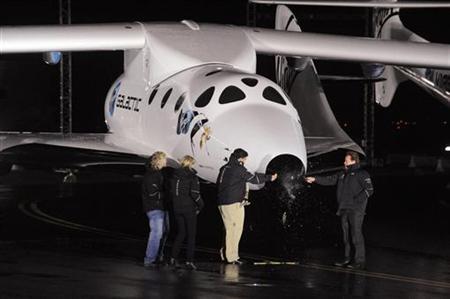
The Obama administration is preparing for a space tourism industry that is expected to be worth $1 billion in 10 years, the head of the Federal Aviation Administration's commercial space office said on Tuesday

Rocket
planes and spaceships to carry passengers beyond the atmosphere, similar to the
suborbital hops taken by Mercury astronauts Alan Shepard and Virgil
"Gus" Grissom in 1961, are being built and tested, with commercial
flight services targeted to begin in 2013 or 2014.
"Based on market studies, we expect to see this
type of activity result in a $1 billion industry within the next 10
years," George Nield, associate administrator for the FAA's Office of
Commercial Space Transportation testified before the House Subcommittee on
Space and Aeronautics.
"This is a new and growing industry. If you look
at the last 25 years, almost all the launches were for the same basic purposes
- to launch a satellite, such as a telecommunications satellite, to orbit - and
that level of business for that part of the industry is continuing today. But
there are several new segments that we see just on the horizon," Nield
said.
The boom in launch business is expected to begin this
year, he said in the hearing, which was carried via webcast.
NASA has hired two companies, privately owned Space
Exploration Technologies and Orbital Sciences Corp., to fly cargo to the
International Space Station, a $100 billion research complex orbiting 240 miles
above Earth. The contracts are worth a combined $3.5 billion.
"We know that's going to start soon, probably
this year," Nield said.
Space Exploration Technologies, which is known as
SpaceX and owned and operated by entrepreneur Elon Musk, is preparing for a
trial run to the station on April 30.
"We need to be careful not to assume that the
success or failure of commercial spaceflight is going to hang in the balance of
a single flight," NASA space station program manager Mike Suffredini told
reporters during a separate news conference.
"If they have problems along the way, it's the
kind of thing you experience in this difficult process of not only trying to
launch into low-Earth orbit, but do the next-hardest thing which is to try to
rendezvous safely with another spacecraft in orbit," Suffredini said.
Also on the horizon are commercial flights that reach
at least 62 miles above the planet, an altitude that exposes passengers to a
few minutes of weightlessness and a view of Earth juxtaposed against the black
sky of space.
In addition to tourism, suborbital spaceflights are
being marketed and sold to research organizations, educational institutes and
businesses that want to conduct experiments and fly payloads in space.
One company, Virgin Galactic, an offshoot of
London-based Richard Branson's Virgin Group, already has collected about $60
million in deposits for rides that cost $200,000 per person.
"Exactly when those launches will start is hard
to predict, but it looks very very clear it's going to be in the next one or
two years," Nield said.

 Previous page
Previous page Back to top
Back to top







